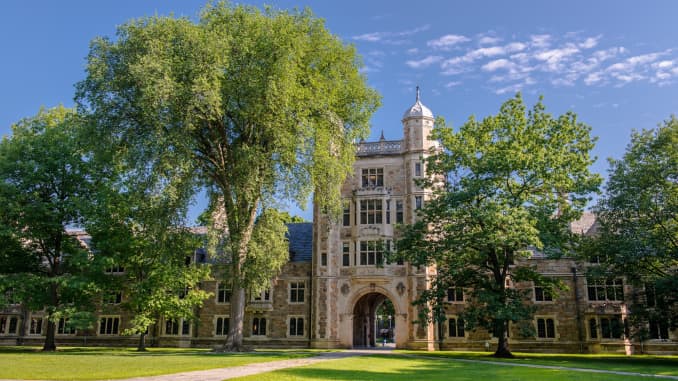Bachelor of Science in Electrical EngineeringChange Course
| About this course | |
|---|---|
| Duration | 4 Years |
| Level | Bachelors Program |
Course Description
- Electrical Engineering is a broadly diverse field that encompasses, for example, controls, communications, signal processing, circuit design, computer engineering, and electronic and photonic devices
- The objectives of the electrical engineering program are to provide students with a solid foundation in electrical engineering within the setting of a liberal arts college for preparation for a diverse range of careers in industry and government, or for advanced work in engineering, business, law, or medicine
- Electrical Engineering enables the acquisition of a broad range of skills and attitudes drawn from the humanities, social sciences, and sciences in addition to engineering, which enhances engineering knowledge and contributes to future leadership and technical success
RankingUniversity Rankings#1Universities Rankings
– ARWU (Shanghai Ranking) 2020#3World University Ranking
– QS 2021#3University Ranking
– THE (Times Higher Education) 2021#2National University Ranking
– US News & World Report 2021#1Global Universities
– US News & World Report 2021Course RankingsEngineering Courses#29UG Electrical, Electronic & Communications Engg.
– US News & World Report 2021
1st year tuition fees
| Fees components | Amount |
|---|---|
| Tuition & fees | INR 36,36,586 |
Other expenses in 1st year
| Fees components | Amount |
|---|---|
| Hostel & Meals | INR 13,46,810 |
| Insurance | INR 2,70,988 |
| Transportation | INR 1,51,973 |
| Fees | INR 3,18,521 |
| Estimated personal expenses | INR 2,56,340 |
| Total | INR 23,44,632 |
Calculated at the exchange rate of 1 USD = INR 73.24|
Tuition & expenses were last updated on 25ᵗʰ May 2020Entry Requirements
| Entry requirements for this course | |
|---|---|
| Class 12th | No specific cutoff mentionedApplicants must have passed high schoolApplicants must have an ideal four-year preparatory program includes four years of English, with extensive practice in writing; four years of math; four years of science: biology, chemistry, physics, and an advanced course in one of these subjects; three years of history, including American and European history; and four years of one foreign language |
| Exams | SAT : AcceptedRequired: SAT (with or without writing)Recommended: Two SAT Subject Tests (except in the case of financial hardship) |
| Additional info | Applicants are not required to take an English proficiency exam (such as the TOEFL, IELTS, etc.), they may submit scores if they wish to do so |
There are few investments quite as solid as earning a bachelor’s degree in engineering.
According to the National Association of Colleges and Employers, the average starting salary for the Class of 2018 was $50,944, and the top-paid graduates were engineering majors. In 2018, the average starting salary for a worker with a bachelor’s degree in engineering was $66,521 and for the Class of 2019, starting salaries were 4% higher — $69,188 on average.
When CNBC Make It compared hundreds of colleges and universities across the country to create our first list of the U.S. colleges that pay off the most, we found that many of the top-ranking schools offered competitive engineering programs.
To develop our list of the top colleges that pay off, we identified the true net cost of each college for the typical American student — including tuition, fees, books, supplies and other expenses — after subtracting scholarships and grants. Using data from Tuition Tracker, we looked at the net cost for students from families making between $48,001 and $75,000.
Then, using data from PayScale’s College Salary Report, we divided net cost by graduates’ expected annual earnings. (You can read our full methodology here.)
To spotlight the schools providing the best value for engineering students, we took a list at the top-scoring schools on U.S. News & World Report’s ranking of the best undergraduate engineering programs to see which schools provide a top-notch education for engineering students — as well as a big pay off. (In the case of a tie, the deciding factor was CNBC Make It’s overall ranking of public and private colleges.)

A MiniCheetah robot does a backflip during a demo at the Massachusetts Institute of Technology in Cambridge, MA on Feb. 26, 2019. The school held a three-day celebration of its new Schwarzman College of Computing, a $1 billion project to integrate computer science into every university department, from genetics to political science and robotics. The program featured students and faculty who showed off software to measure fetal health, blood pressure, poverty rates in Nairobi – even an improved algorithm for online shopping.Jessica Rinaldi/The Boston Globe via Getty Images
MIT takes first place U.S. News’ list. According to The Hechinger Report, the net cost for a student from a family that earns between $48,001 and $75,000 is $8,633 per year. MIT graduates with more than 10 years of experience report average salaries of $150,400, due in large part to the fact that 91.4% of all degrees awarded by MIT are in high-paying STEM fields
A majority of MIT’s undergraduate students are enrolled in the school of engineering. During the 2018 – 2019 school year, 2,471 of MIT’s 4,833 undergrads majored in an engineering field.
Earning an undergraduate degree in engineering is no easy task, but a high percentage of MIT students graduate on time. The average six-year college graduation rate in the U.S. is about 60% for all bachelor’s students and 54% for engineering undergrads. But at MIT, nearly 94% of students graduate in six years.
Here are the top 15 U.S. colleges that pay off the most for engineering students:
California Institute of Technology

California Institute of TechnologyDanita Delimont | Getty Images
California Institute of Technology, known as CalTech, is a private, nonprofit engineering university located in Pasadena, California. The CalTech curriculum emphasizes STEM education and all students are required to take math, physics, chemistry, biology and scientific communication courses.
U.S. News & World Report engineering program ranking: 4
CNBC Make It ranking: 4, private schools
Average net cost (income $48,001-$75,000): $6,781
Median salary for alumni with 0-5 years of experience: $83,400
Median salary for alumni with 10+ years of experience: $143,100
Salary average, early and mid career: $113,250
Columbia University

Columbia UniversityGetty Images
Columbia University is a private Ivy League university in New York City. Founded in 1754, Columbia is the fifth-oldest college in the United States. Columbia students can choose from 80 areas of study but must take six required classes, such as Contemporary Civilization and Frontiers of Science, and must fulfill several requirements including taking a foreign language.
U.S. News & World Report engineering program ranking: 18
CNBC Make It ranking: 7, private schools
Average net cost (income $48,001-$75,000): $6,592
Median salary for alumni with 0-5 years of experience: $69,200
Median salary for alumni with 10+ years of experience: $127,500
Salary average, early and mid career: $98,350
Duke University

Duke UniversityLance King | Getty Images
Located in Durham, North Carolina, Duke University is a private university. The southern school, known for its strong athletic program, offers 4,000 courses each semester. The most popular major among Duke undergrads is computer science and 83% of students study more than just one major.
U.S. News & World Report engineering program ranking: 18
CNBC Make It ranking: 10, private schools
Average net cost (income $48,001-$75,000): $7,880
Median salary for alumni with 0-5 years of experience: $68,700
Median salary for alumni with 10+ years of experience: $133,100
Salary average, early and mid career: $100,900
Georgia Institute of Technology, Atlanta

Georgia Tech
Georgia Institute of Technology, often referred to as “Georgia Tech,” is a public university located in Atlanta. The school offers technology-focused education to more than 25,000 undergraduate and graduate students across six colleges and 28 schools focusing on business, computing, design, engineering, the liberal arts and sciences.
U.S. News & World Report engineering program ranking: 4
CNBC Make It ranking: 5, public schools
Average net cost (income $48,001-$75,000): $12,284
Median salary for alumni with 0-5 years of experience: $70,800
Median salary for alumni with 10+ years of experience: $131,900
Salary average, early and mid career: $101,350
Harvard University

Harvard UniversityDenisTangneyJr | iStock | Getty Images
Founded in 1636, Harvard University in Cambridge, Massachusetts, is the oldest college in the United States. Harvard is known for its historic legacy, famous alumni and generous financial aid, which the university is able to provide in part because of an endowment worth approximately $39.2 billion. Harvard students select “concentrations” instead of majors and one of the most popular is economics.
U.S. News & World Report engineering program ranking: 24
CNBC Make It ranking: 5, private schools
Average net cost (income $48,001-$75,000): $6,577
Median salary for alumni with 0-5 years of experience: $72,600
Median salary for alumni with 10+ years of experience: $142,600
Salary average, early and mid career: $107,600
Massachusetts Institute of Technology

MITKevin Fleming | Corbis Documentary | Getty Images
Massachusetts Institute of Technology is a STEM-focused private, nonprofit university located in Cambridge, Massachusetts. Instead of majors, MIT students choose a “course” to specialize in. Electrical engineering, mechanical engineering and computer science are among the most popular courses at MIT.
U.S. News & World Report engineering program ranking: 1
CNBC Make It ranking: 8, private schools
Average net cost (income $48,001-$75,000): $8,633
Median salary for alumni with 0-5 years of experience: $83,600
Median salary for alumni with 10+ years of experience: $150,400
Salary average, early and mid career: $117,000
Princeton University

Princeton University Photo: Princeton University, Office of Communications.
Princeton University was founded in 1746, making it the fourth-oldest college in the United States. Undergraduate Princeton students study one of 37 concentrations and must be proficient in at least one language other than English. Known for its strong engineering program, approximately 25% of undergraduates at the Ivy League school study in the School of Engineering and Applied Sciences.
U.S. News & World Report engineering program ranking: 12
CNBC Make It ranking: 2, private schools
Average net cost (income $48,001-$75,000): $4,557
Median salary for alumni with 0-5 years of experience: $72,700
Median salary for alumni with 10+ years of experience: $141,300
Salary average, early and mid career: $107,000
Purdue University, West Lafayette

Purdue UniversityMichael Hickey/Getty Images
Purdue University’s campus in West Lafayette, Indiana, is the flagship campus of the Purdue University system. The public university enrolls 32,672 undergraduate students. Known for its strong engineering program, 28% of undergraduate students at Purdue study in the College of Engineering.
U.S. News & World Report engineering program ranking: 9
CNBC Make It ranking: 6, public schools
Average net cost (income $48,001-$75,000): $10,828
Median salary for alumni with 0-5 years of experience: $60,200
Median salary for alumni with 10+ years of experience: $105,800
Salary average, early and mid career: $83,000
Rice University

Rice UniversityCraig Hartley | Bloomberg | Getty Images
Rice University is a private, nonprofit university located in Houston. Undergraduate students at Rice can study more than 50 different majors in the George R. Brown School of Engineering, the Shepherd School of Music, the School of Architecture, the School of Humanities, the School of Social Sciences and the Wiess School of Natural Sciences.
U.S. News & World Report engineering program ranking: 18
CNBC Make It ranking: 15, private schools
Average net cost (income $48,001-$75,000): $10,080
Median salary for alumni with 0-5 years of experience: $69,200
Median salary for alumni with 10+ years of experience: $133,600
Salary average, early and mid career: $101,400
Stanford University

Stanford UniversityDavid Butow | Getty Images
Stanford University, often referred to as the “West Coast Ivy,” is located near Silicon Valley in Stanford, California. The highly selective school is known for its strong science, technology and engineering programs as well as its successful athletics programs. Stanford enrolls approximately 7,083 undergraduate students.
U.S. News & World Report engineering program ranking: 2
CNBC Make It ranking: 1, private schools
Average net cost (income $48,001-$75,000): $4,061
Median salary for alumni with 0-5 years of experience: $76,500
Median salary for alumni with 10+ years of experience: $143,100
Salary average, early and mid career: $109,800
University of California, Berkeley

University of California, BerkeleyRick Gerharter | Getty Images
University of California, Berkeley, is the flagship school of the University of California system. Located in Berkeley, California, near San Francisco, the university enrolls some 30,853 undergraduate students. The school is home to the Haas School of Business.
U.S. News & World Report engineering program ranking: 3
CNBC Make It ranking: 25, public schools
Average net cost (income $48,001-$75,000): $17,413
Median salary for alumni with 0-5 years of experience: $68,300
Median salary for alumni with 10+ years of experience: $132,300
Salary average, early and mid career: $100,300
University of California, Los Angeles

UCLAAl Seib | Los Angeles Times | Getty Images
One of the most selective schools in the University of California school system, the University of California, Los Angeles, is known for its strong athletics department. The most popular majors at UCLA are biology, business economics, political science, psychology and psychobiology.
U.S. News & World Report engineering program ranking: 18
CNBC Make It ranking: 9, public schools
Average net cost (income $48,001-$75,000): $12,416
Median salary for alumni with 0-5 years of experience: $60,000
Median salary for alumni with 10+ years of experience: $118,500
Salary average, early and mid career: $89,250
University of California, San Diego

University Of California, San DiegoEducation Images | Getty Images
University of California, San Diego, is part of the University of California school system and is located in La Jolla, California. The public university enrolls approximately 30,285 undergraduate students and is known both for its fine arts program and its engineering program.
U.S. News & World Report engineering program ranking: 18
CNBC Make It ranking: 11, public schools
Average net cost (income $48,001-$75,000): $13,367
Median salary for alumni with 0-5 years of experience: $61,300
Median salary for alumni with 10+ years of experience: $126,800
Salary average, early and mid career: $94,050
University of Michigan, Ann Arbor

University of Michigantiny-al | Getty Images
University of Michigan, Ann Arbor, is the flagship campus of the University of Michigan school system. The public university offers 263 degree programs, enrolls 29,026 undergraduate students and is known for its athletics program.
U.S. News & World Report engineering program ranking: 6
CNBC Make It ranking: 4, public schools
Average net cost (income $48,001-$75,000): $10,106
Median salary for alumni with 0-5 years of experience: $62,000
Median salary for alumni with 10+ years of experience: $107,900
Salary average, early and mid career: $84,950
University of Washington, Seattle

University of WashingtonNikko Hellstern | Getty Images
The University of Washington, Seattle, is the flagship school of the University of Washington school system. The large public university offers more than 180 majors and is known for its computer science program.
U.S. News & World Report engineering program ranking: 18
CNBC Make It ranking: 1, public schools
Average net cost (income $48,001-$75,000): $8,984
Median salary for alumni with 0-5 years of experience: $59,900
Median salary for alumni with 10+ years of experience: $111,800
Salary average, early and mid career: $85,850